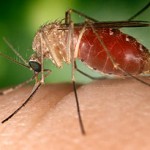
The easiest and best way to avoid WNV is to prevent mosquito bites.
The City of Somerville Health Department issued a reminder today that with warmer temperatures expected this week, residents are advised to continue to take precautions against mosquitoes, which may carry diseases such as EEE or West Nile Virus.
The Massachusetts Department of Public Health released the following statement and prevention tips last week: “Even as cooler temperatures begin arriving in the state, the fact is that the threat of mosquito-borne illness will continue until the first hard overnight frost,” said DPH State Public Health Veterinarian Dr. Catherine Brown. “In the meantime, it’s vitally important that we continue taking common-sense precautions against mosquito bites: use insect repellant, cover up, and avoid outdoor activities at dusk and after nightfall when mosquitoes are at their most active.”
Avoid Mosquito Bites
- Apply Insect Repellent when Outdoors. Use a repellent with DEET (N, N-diethyl-m-toluamide), permethrin, picaridin (KBR 3023), oil of lemon eucalyptus [p-methane 3, 8-diol (PMD)] or IR3535 according to the instructions on the product label. DEET products should not be used on infants under two months of age and should be used in concentrations of 30% or less on older children. Oil of lemon eucalyptus should not be used on children under three years of age.
- Be Aware of Peak Mosquito Hours. The hours from dusk to dawn are peak biting times for many mosquitoes. Consider rescheduling outdoor activities that occur during evening or early morning
- Clothing Can Help Reduce Mosquito Bites. Wearing long-sleeves, long pants and socks when outdoors will help keep mosquitoes away from your skin.
Mosquito-Proof Your Home
- Drain Standing Water. Mosquitoes lay their eggs in standing water. Limit the number of places around your home for mosquitoes to breed by either draining or discarding items that hold water. Check rain gutters and drains. Empty any unused flowerpots and wading pools, and change water in birdbaths frequently.
- Install or Repair Screens. Keep mosquitoes outside by having tightly-fitting screens on all of your windows and doors.
Protect Your Animals
Animal owners should reduce potential mosquito breeding sites on their property by eliminating standing water from containers such as buckets, tires, and wading pools – especially after heavy rains. Water troughs provide excellent mosquito breeding habitats and should be flushed out at least once a week during the summer months to reduce mosquitoes near paddock areas. Horse owners should keep horses in indoor stalls at night to reduce their risk of exposure to mosquitoes. If an animal is diagnosed with WNV or EEE, owners are required to report to Department of Agriculture (DAR), Division of Animal Health by calling 617-626-1795 and to the Department of Public Health (DPH) by calling 617-983-6800.












Reader Comments